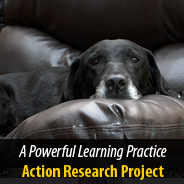How can we safely increase our teachers’ and students’ use of and comfort level with technology and technology-enhanced learning?
At the moment, some faculty, students, and parents are comfortable with technology, but others are resistant to or ignorant of its potential as anything more than a vehicle for entertainment. In this climate, we are not able to provide open access to technology or the Internet. Current policy bans personal devices in the classroom, blocks many websites on the grounds that they have the potential for inappropriate use, and creates daily competition for limited technology resources. These measures have proven necessary because digital citizenship is neither consistently taught nor practiced in our school community and because many of our community members do not understand the most effective uses for technology to enhance learning.
We are creating a long-term technology plan to implement a digital citizenship curriculum to enhance our students’ and teachers’ appropriate use of technology and social media. We are expanding professional development strategies to promote technology use in the classroom. So far, assessment has shown mixed results, revealing mostly positive response to peer-to-peer training and flexible learning through tutorials, but less positive response to interest-based learning and innovative uses of technology in the classroom. We will know we have achieved success when it is no longer necessary to use blocking software or to ban personal devices for fear of their misuse; another indicator of success will be more universal application of a variety of technologies and strategies for use with interest-based learning.
To date:
- Recruitment of team for PLP and attendance at PLP kickoff
- Participation of team in NING and Eluminate sessions.
- Peer-to-peer inservice with an emphasis on technology and collaboration
- Staff survey to assess inservice
- Development of Wiki
- Subscription to Atomic Learning
- Evaluation of ISTE.nets and Board objectives for integration of continued technology based learning.
- Examination of some pre-packaged Digital Citizenship curricula
- Scripted, filmed, and edited Our Journey
- Put together presentation board/movie screen
Future goals:
- Participation of all faculty in Atomic Learning, school Wiki, peer-to-peer training, and development of interest-based lessons
- Implementation of safe, effective digital citizenship curriculum and policies
- Creative sharing of technology
- Established minimum requirement of technology professional development for teachers
- End-of-year inservice for teachers to kick-off new technology initiatives
We are beginning to implement our plans for 21st century learning, but we have more to explore and evaluate. We have a much better idea of where the faculty is in terms of interest and understanding of technology, and we have identified that there is a need for change of atmosphere in order to keep our students engaged and our school competitive. We have coordinated our own efforts with the higher vision of our board of directors for the future of our school. We are clear that there is not a cookie-cutter solution and that we will have to find our way within the established identity of the school to do what is best for our students, our faculty, and our community.
We have understood better than ever that technology alone is not sufficient unless there is a viable strategy for using it effectively and are resolved to continue investigating tested applications so that we can present our faculty with strategies as well as equipment and access. We are clear that professional development is crucial. We have increased the number of people on our technology advisory team and have more people engaged in technology than previously.
One of our team members attended a conference on Learning and the Brain and came away with the sense that studies of brain science are significant in decisions about using technology. Other members of the team attended a technology fair and learned about new possibilities for implementation.
We have collected and begun to evaluate existing digital citizenship programs, knowing that this is key to freer access to online opportunities.
We have gained confidence in ourselves as leaders and visionaries. We know that we can conduct peer-to-peer training without being masters of every technology available. We know that our experience and perspectives can help spark discussions and build relationships for future change.
We are putting together a packet of summer reading for all staff, have planned training on the new software before the end of the year, have begun our own wiki for our staff, and have participated fully in the PLP program to broaden our understanding of the issues and attitudes prevailing in the changing field of education.


